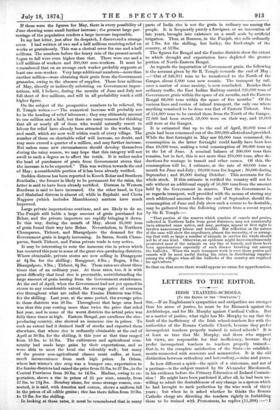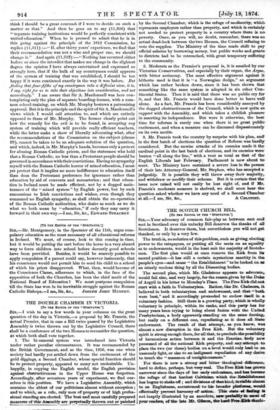LETTERS TO THE EDITOR.
IRISH TRAINING-SCHOOLS.
go THE EDITOR OF THE " SPECTATOR...3 SIR,7-If an Englishman's sympathies and antipathies are stronger than his sense of justice, he must be for Bismarck against the Archbishops, and for Mr. Murphy against Cardinal Cullen. But as a matter of justice, what right has Mr. Murphy to say that the fault of the inefficiency of the Irish school-teachers lies with the authorities of the Roman Catholic Church, because they prefer incompetent teachers properly trained in mixed schools ? It is at least as true that Mr. Murphy, and those who support his views, are responsible for that inefficiency, because they prefer incompetent teachers to teachers properly trained— that is, to the complete satisfaction of the State—in establish- ments connected with convents and monasteries. It is the old distinction between orthodoxy and heterodoxy,—mine and yours.
In how different a spirit—the spirit of a statesman, and not of a partisan—is the subject treated by Sir Alexander Macdonnell, in his evidence before the Primary Education of Ireland Commis- sion I He might have been pardoned if, after all, he had been un- willing to admit the desirableness of any change in a system which he had brought to such perfection by the wise work of thirty years ; but when he is asked whether he thinks the Roman Catholic clergy are directing the teachers rightly in forbidding them to be trained with Protestants, he replies (11,298) :—" I
think I should be a great coxcomb if I were to decide on such a matter as that." And then he goes on to say (11,306) that "separate training institutions would be perfectly consistent with united education." When he is pressed to admit that he is in this going against the principle of the 1812 Commission, he replies (11,311) :—" If, after thirty years' experience, we find that their recommendation was not a wise and proper one, we should change it." And again (11,313) :—" Nothing has occurred either before or since the interdict that makes me change in the slightest degree the opinion I have always entertained and expressed so strongly here, that if the bulk of my countrymen could approve of the system of training that was established, I should be too happy if it were continued exactly in the way it was before. But finding that/our-fifths of my countrymen take a dijferint view, it is, .1 say, right for vs to take their objections into consideration, and act accordingly." I am aware that Sir A. 3facdonnell was here con- templating only the plan of separate boarding-houses, with a com- mon school-training, on which Mr. Murphy bestows a patronising approval. But it is the principle and the spirit of Sir A. Macdonnell's views which I would call attention to, and which are entirely opposed to those of Mr. Murphy. The former clearly point out how the remedy for the evil is to be found, in accepting any system of training which will provide really efficient teachers, while the latter make a show of liberally advocating what, after the recommendations of the Commission on the subject (clause 99), cannot be taken to be an adequate solution of the question, and which, indeed, in Mr. Murphy's hands, becomes only a pretext for abusing Roman Catholic priests, and the statesmen who hold that a Roman Catholic, no less than a Protestant people should be governed in accordance with their convictions. Having no sympathy myself with the Roman Catholic horror of mixed education, I must yet protest that it implies no more indifference to education itself than does the Protestant preference for ignorance rather than education by aid of convents and monasteries ; and that educa- tion in Ireland must be made efficient, not by a dogged main- tenance of the "mixed system" by English power, but by such concessions to Irish convictions and wishes, even though they command no English sympathy, as shall obtain the co-operation of the Roman Catholic authorities, who desire as much as we do what we both mean by "education," if only they may carry it forward in their OWIL way.—I am, Sir, &O., EDWARD STRACHEY



































 Previous page
Previous page